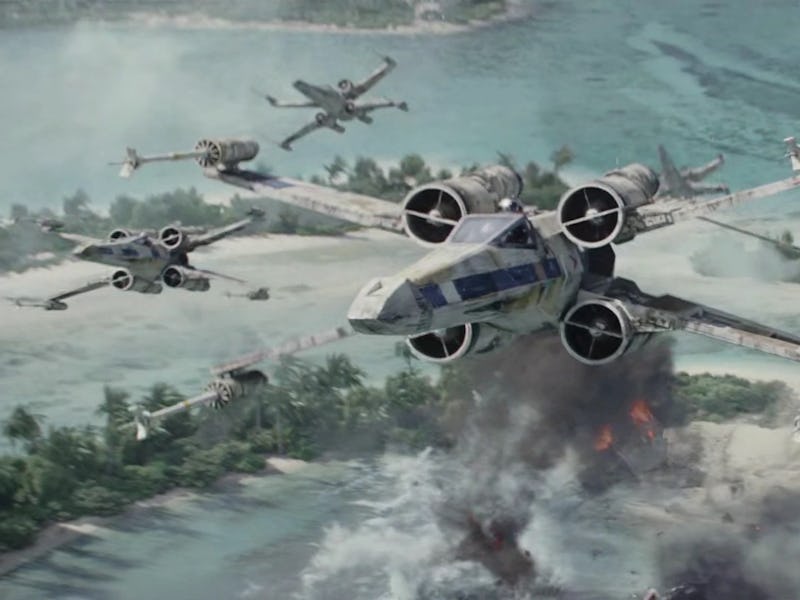Star Wars just fixed a weird Rogue One plot hole
Why is the Rebel Alliance called "an alliance?" Now we know.

Some Rebels are so rebellious that even other Rebels don’t want to be associated with them. In Rogue One: A Star Wars Story, we learned that despite being very much against the Empire, Saw Gerrera (Forrest Whittaker) wasn’t well-liked among the official leaders of the Rebel Alliance. But why? In Andor Episode 8, the complex factions of the Rebellion are revealed in greater detail than we’ve ever seen.
Spoilers ahead for Andor Episode 8.
Toward the end of Episode 8, Luthen (Stellan Skarsgård) travels to Segra Milo, where we find Gerrera hiding in a cave. We see Edrio "Two Tubes" guarding this hideout, and a black-and-grey X-wing parked and presumably ready for action.
Luthen and Saw both pretend to not know which Rebellion faction could have pulled off the heist on Aldhani, which demonstrates the lengths these folks will go to keep secrets. Recall that in the last episode we were told Luthen’s assistant Kleya (Elizabeth Dulau) put a hit out on Cassian because he knows too much. Even a meeting between uneasy allies like Luthen and Saw is fraught with all sorts of mistrust and double meanings.
As the audience, we know what Luthen knows, but because we don’t know what Saw knows, Andor has introduced a late-in-the-season “legacy” cameo while also making the vagueries of the Rebellion’s origin a little clearer.
Luthen uses a secret Rebel channel in ‘Andor.’ But of course, it’s not called a Rebel channel at this point.
Why is it called the “Rebel Alliance?”
As a prequel to both Rogue One and A New Hope, the amount of continuity that Andor is explaining is staggeringly impressive. In Episode 8 alone, we fully grasp the ways in which the Empire was able to use forced-labor camps to build their tech, while simultaneously understanding why the Empire was also kind of bad at tracking down specific people.
Meanwhile, Mon Mothama’s (Genevieve O'Reilly) attempts to shuffle money around in pseudo-legitimate ways help to explain some of the bigger resources the Alliance has later. But the big moment of clarity is the conversation between Luthen and Saw. This moment really lays out why the Rebellion had it so tough at the beginning.
At this point in the timeline, there is no “Alliance.” At least, not the one we know. Saw lists the following groups:
- Separatists (presumably a hold-over from the Clone Wars)
- Neo-Republicans (people who want to restore the Old Republic)
- The Ghorman Front (unclear, but Mon Motham is worried about this)
- The Partisan Alliance (also unclear, but Cassian has mentioned it, too.)
All of these groups, movements, and ideologies are seemingly separate and only seem to communicate with each other through people like Luthen and Mon Mothma. At this point, the larger fusion of these groups doesn’t exist yet. That future team-up is in all likelihood why it’s called the Rebel “Alliance.” All of these disparate rebels are corralled into one group.
Luthen says emphatically, “We need to pull together, Saw...whatever our final version of success looks like, there’s no chance any of us can make it real on our own.” Luthen is right. All of these factions have to be rolled together into one Rebel Alliance to get anything done. But in the timeline of Andor, they’re not there yet. Not even close.
Saw makes his political views clear in Andor.
Saw’s anti-Alliance stance, explained
Luthen accuses Saw of “fighting with people who agree with you,” which is a pretty straightforward way of describing the relationship Saw has with the Rebels closer to the events of A New Hope. A few years later in the animated series Rebels episode “Ghosts of Geonosis,” Saw tortures a prisoner for information about an Imperial superweapon. Then, in Rogue One, we learn that Mon Mothma and everyone else (including Cassian) has basically branded Saw as an extremist who is more trouble than he’s worth.
In both Rebels and in Rogue One, this issue is mostly presented as ethical relative to Saw’s logistics. Saw is too extreme and too murderous. At some point, the larger Rebel Alliance couldn’t be associated with those methods, at least not publicly.
But what Andor reveals is that it’s a little dicier than that. Saw doesn’t like most factions within the pantheon of the Rebellion because he thinks they are “sectorists,” meaning they’re all still more concerned with their own territories (or sectors) rather than seeing the big picture. He rants that other Rebels are “Galaxy partitionists” implying that their goals and his goals are not the same.
Basically, Saw doesn’t want to restore the Republic. He claims to have “clarity of purpose,” and Luthen boils that view down to anarchy. Saw doesn’t correct him. This means that, apparently, Saw is an anarchist.
And if you look at how both the Republic and the New Republic turn out in the Star Wars galaxy, can you really blame him?
Andor streams on Disney+.
This article was originally published on